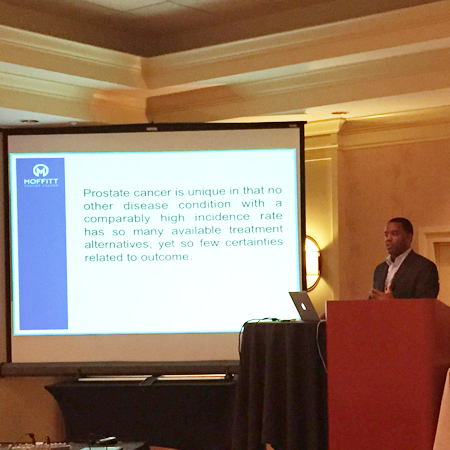Late-breaking abstract submissions closed on 17 August 2015. Late-breaking submissions will only be considered for poster presentation. They will also not be published with the regular abstracts in the Journal of Cancer Education supplement (which has already gone to our journal publisher for printing), but they will be printed in the conference guidebook distributed to all attendees at the conference.

General Information
The 2015 International Cancer Education Conference, organized by AACE, CPEN and EACE, is accepting abstracts that emphasize cancer education curricula, programs and/or initiatives across the cancer continuum. Abstracts must relate to the conference theme, Cancer Education in Diverse Populations: Disparities, Genomics and Innovations. Abstracts must be categorized as either Research or Innovations in Cancer Education, and one of eight possible focal areas must be indicated during the abstract submission (see the Focal Areas section for more details). Authors will also have the opportunity to indicate up to five keywords for their submission from a list of over 60 options. Please read the Author Instructions document, which includes the review criteria, before submitting an abstract. In addition, authors submitting in the Innovations in Cancer Education category should read the Innovations Abstract Criteria document.
Abstract Submission Deadlines
Abstract Submission Opens: mid-Feb 2015Abstract Submission Closes: 10 May 2015Abstract Notifications Sent: early June 2015Final Program Posted: early July 2015Late-Breaking Poster Abstract Submission Opens: late July 2015Late-Breaking Poster Abstract Submission Closes: 17 Aug 2015- Late-Breaking Poster Abstract Notifications Sent: mid-Sep 2015
- Oral Presentations Due to Conference Organizers: 21 Sep 2015
- Poster Presentations Due to Conference Organizers: 14 Oct 2015
Abstract Categories
Abstracts are required to be sorted into one of two categories:
- Research in Cancer Education, including research conducted in the field of cancer education.
- Innovations in Cancer Education, including projects or programs developed to meet a specific need in cancer education at any point throughout the cancer continuum. Submissions in this category must conform to the Innovations Abstract Criteria.
Focal Areas
All authors must identify one of the following focal areas as the best fit for each abstract:
- Diverse and Medically Underserved Populations: Best practices in cancer education for focused populations. Examples of special populations include ethnic or racial minorities, veterans, adolescents and young adults, geriatrics, LGBTQ, and others.
- Genomics and Precision Medicine: Programs or research that educate patients and families on the complex genetic and molecular aspects of cancer screening, diagnosis, treatment, and follow-up care.
- Global Cancer Education and International Collaboration: Share effective cancer education approaches from throughout the world.
- Health Literacy and Communication across the Cancer Spectrum: Highlight culturally and linguistically appropriate pathways for effective cancer communication from prevention through end-of-life.
- Healthcare Professional Education: Including medical, nursing, pharmacy, social work, etc., trainees with an additional emphasis on supporting student development.
- Integrating Technologies and Multimedia into Cancer Education: Showcase developing, implementing, and evaluating creative and innovative multimedia solutions to cancer education, including social media integration, e-learning modules, and more.
- Patient and/or Family Education: Program development, implementation, and evaluation: successes, challenges, lessons learned.
- Survivorship and Psychosocial Oncology: Highlight research or innovative programs that educate patients and families on complex survivorship issues and psychosocial aspects of care.
Keywords
Authors may also choose up to five of the following keywords to further classify their abstract:
- Age Group: Geriatric
- Age Group: Pediatric
- Age Group: Young Adults
- Age Group: Other: ________________
- Cancer Prevention
- Cancer Screening
- Chemotherapy-Induced Nausea and Vomiting
- Clinical Trials
- Community
- Culture: African
- Culture: African-American
- Culture: Alaska Native/American Indian/Indigenous People
- Culture: Asian
- Culture: Asian-American
- Culture: Hispanic
- Culture: Middle Eastern
- Culture: Other: ________________
- End-of-Life
- General Oncology
- Genomics/Genetics
- Immuno-Oncology
- Health Disparities
- Metastatic Cancer
- Palliative
- Patient & Community Education
- Policy
- Psychosocial Care
- Secondary Cancer
- Site/Type: B Cell Malignancies
- Site/Type: Breast Cancer
- Site/Type: Cervical/Uterine/Ovarian Cancer
- Site/Type: Colorectal Cancer
- Site/Type: Gastric Cancer
- Site/Type: Gastrointestinal Stromal Tumors
- Site/Type: Genitourinary Cancer
- Site/Type: Glioblastoma
- Site/Type: Head & Neck Cancer
- Site/Type: Hematologic Malignancies
- Site/Type: Hepatocellular Carcinoma
- Site/Type: Hodgkin’s Lymphoma
- Site/Type: Leukemia and Lymphoma
- Site/Type: Lung Cancer
- Site/Type: MDS
- Site/Type: Medical/Molecular Diagnosis
- Site/Type: Melanoma/Skin Cancer
- Site/Type: Multiple Myeloma
- Site/Type: Non-Hodgkin’s Lymphoma
- Site/Type: Non-Small Cell Lung Cancer
- Site/Type: Ovarian Cancer
- Site/Type: Pancreatic Cancer
- Site/Type: Pancreatic Neuroendocrine Tumors
- Site/Type: Prostate/Testicular Cancer
- Site/Type: Renal Cell Carcinoma
- Site/Type: Sarcoma
- Site/Type: Solid Tumor
- Site/Type: Thyroid Cancer
- Site/Type: Other: ________________
- Smoking Cessation
- Special Population: Lesbian/Gay/Bisexual/Transsexual
- Special Population: Prisoners
- Special Population: Under-represented Healthcare Professionals
- Special Population: Veterans
- Special Population: Other: ________________
- Supportive Care
- Survivorship
- Other: ________________
Review Criteria
When abstracts are reviewed, they will be graded based on the following review criteria:
- Quality of each section requested for either Research or Innovations in Cancer Education (Background/Purpose, Methods or Description, Results/Findings or Evaluation, Discussion or Usefulness)
- Relation to conference theme
- Appropriateness of the focal area of the abstract